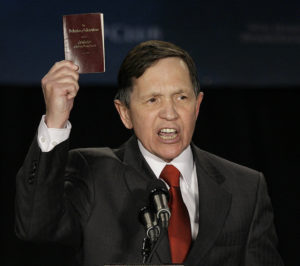Kucinich Blasts Democrats
Not everyone was celebrating the passage of the Iraq spending bill on Friday. Rep. Dennis Kucinich, D-Ohio, told Truthdig it's "a disaster for the American people." The presidential candidate went on to explain his dissatisfaction with his party: "It's the same kind of thinking that led us into Iraq -- that we didn't have any alternatives."
Not everyone was celebrating the passage of the Iraq spending bill on Friday. Rep. Dennis Kucinich, D-Ohio, told Truthdig it’s “a disaster for the American people.” The presidential candidate went on to explain his dissatisfaction with his party: “It’s the same kind of thinking that led us into Iraq — that we didn’t have any alternatives.”
Listen:
(running time: about 12 mins / 11.2 MB)
Transcript:
James Harris:
This is Truthdig on the phone, Dennis Kucinich, representative from the state of Ohio since 1996. Today we have the honor of talking to you just after the bill that passed on the House floor, a bill that will require President Bush to oppose benchmarks for progress on the Iraqi government and link them to the continued presence of American combat troops. Dennis, is this bill a victory for Democrats?
Dennis Kucinich: It’s a disaster for the American people. The Democrats should have been voting — or come up with a plan to get out of Iraq. Not one that’s going to keep us there a year or two. It’s the same kind of thinking that led us into Iraq — that we didn’t have any alternatives. It’s the same thing that caused the Democrats to construct a plan that will keep us there at least for a year, and saying, well, we don’t have any other alternatives. I can tell you something, we could have come up with a plan that would have called for the troops to come home in the next few months. But we didn’t do that, so I, no one can tell me it’s a time for celebration. It’s a disaster.
Harris: What should we do instead, Dennis?
Kucinich: We should be listening to what the American people had to say last October, and that is taking steps to immediately end the war. And that means to set in motion a plan to end the occupation, close the bases, bring the troops home using money that’s already in the pipeline to do so. At the same time there’s a parallel process of bringing in international security and peacekeeping forces to stabilize Iraq. And we can get that help once we end the occupation. Then you have to have a number of other steps that are taken. Most people aren’t aware that this bill that Congress passed sets the stage for the privatization of Iraq’s oil, oil industry. To have the Democratic Party involved in something like that is outrageous. Furthermore, we should be pushing for the stabilization of Iraq’s food and energy crisis. There’s no talk about that. Basically we’re blaming Iraq for the disaster that the United States and this administration visited upon them. We’re telling them, either they’re going to get their house in order or we’re going to leave. Well, you know what, this approach is wrongheaded and the Democrats should have known better and they should have done better.
Harris: Nancy Pelosi, I think she’s partying right now. She feels like she’s done a good job. I’m going to say, Dennis, that I think she has done a good job if you follow the diplomatic line of things. She couldn’t go in with guns blazing and saying “get those troops out.” These benchmarks do mean something.
Kucinich: Why couldn’t she have said: “This war must end”? Congress has the power to cut off funds. Congress has the power to limit the funds. Congress could have taken a new direction. Let’s face it, Democrats are expected to do that. … We need to go in a new direction. And that direction is out. And the fact that we gave the president money today to keep the war going through the end of his term constitutes a sellout of the interests of the American people. And a continuation of the war for another year at least, possibly two, and this is just wrong. Just totally wrong.
Josh Scheer: Now with the president, he said he’s going to veto this. And he said this is an act of political theater. And this bill will go nowhere. How is this going to effect the funding? Is he going to get that, or is he going to try to line-item it?
Kucinich: First of all, the Democrats were too quick to compromise. For the president to call it political theater shows the contempt he has for Congress. And Congress has a responsibility to challenge this administration’s conduct of the war; they didn’t do it. They gave the president a license to continue to prosecute the war, and the president said, look, I’m not going along with any restrictions you want to put on me. He doesn’t intend to. He intends to keep this war going. And when you consider that 218 Democrats or 216 Democrats voted for this bill and you match that to the 212 Republicans, or, excuse me, 208 — I believe it was 210 Republicans that voted against it — the president has enough support in the Congress to keep the war going. That’s pretty clear. What about what the American people think? Isn’t this supposed to be representative government? Do you think that support for the war has really grown? Not by a long shot has it grown. What’s happened is that support for the war is being tolerated inside the Congress. This is upside down. If the Democrats had told the American people in October 2006, “Vote Democrat, we’ll keep the war going till the end of Bush’s term; vote Democrat, we’ll privatize Iraq’s oil; vote Democrat, we’ll give the president enough money to attack Iran if he so chooses,” the American people would have never voted Democrat. But guess what, they did vote Democrat, and the Democrats have turned around and handed the president a license to keep that war going, and that’s not even enough for him. Because he doesn’t want any restrictions placed on him, and the fact of the matter is even if they put restrictions on him he wouldn’t follow them anyhow. Scheer: Now, what about the speaker, because she comes from probably one of the most liberal districts in the country, in San Francisco. She got fiery right before she became the speaker. What’s her responsibility? Why did she tone it down? Why is she compromising with the president?
Kucinich: Speaker Pelosi has her own problem; I’m talking about the entire Democratic caucus here. I’m saying that Democrats should have stood for getting out of Iraq immediately, and we didn’t. And the war is going to go on. The bottom line out of all this is that the president got money to keep the war going. He’ll veto it, and it’ll come back to Congress to come up with a plan that will be even weaker. We should have come out very strong; we knew he was going to veto it anyhow. We should have come out strong and indicated that the Democrats stand for truly getting out of Iraq. We didn’t show that by this bill. You could say, “Well, we reached a timeline”; that doesn’t mean a thing. People say, well, constitutionally it means everything. If it means everything then why didn’t we set a timeline of 90 days. Why a year, why a year and a half? We just have to put an end to this nonsense. We’ve got to get out of Iraq. This war is destroying the aspirations of people, for housing, healthcare, education. It’s ruining America’s reputation in the world. It’s destabilizing the region. The president’s rattling the sabers against Iran, he can use money in this bill to attack Iran. They took out a provision in this bill that would have caused him to have to come back to Congress. It will privatize the oil of Iraq. They call this a victory? For whom?
Harris: Dennis, I’ve been listening to you since probably 2003 when you really started to come on strong in the election. You haven’t wavered on your position about Iraq. You’ve always felt that we need to walk in and take the troops out. I think that you’re quite honest when you say that Democrats didn’t follow through on their promise to get us out of Iraq. Will there really be a change in policy in the way that Democrats are trying to tear down this Republican house?
Kucinich: We have to move past partisanship here. You know, there was a lot of talk about voting with the team today. About Democratic unity. For what? For war? Are you kidding? I mean, how about unity for peace? How about unity to challenge unilateralism? How about unity for healthcare, for education, for jobs? You know, because all those aspirations are directly affected to the degree that we continue to spend more money for war. Don’t forget, we’re talking about at least a hundred billion dollars. All this money going for war. It just has to stop. We are at a turning point in this country’s history. Either we’re going to make a real commitment to peace and to diplomacy and international cooperation, or we’re going to descend into some lower circle of Dante’s Inferno where we have nothing but destruction and where we have all hope lost. We have to take a new direction, and that’s what I stand for. I don’t like having to vote against a majority of the people I serve with in the Congress, but I have to tell you something: I couldn’t see any other place to be today. And you have to remember that I proposed an alternative which is still viable. And it’s HR 1234, and it’s the plan to end the Iraq war, and it’s more necessary now than ever. And when the president vetoes the bill, as he will, I’m going to go back to my colleagues and insist that this bill, HR 1234, is the only way to end the war. And maybe that will be the time that they see the necessity of standing for peace.
Harris: Where can we read about HR 1234?
Kucinich: Go to my website at kucinich.us, OK?
Scheer: Great, thank you, Dennis. The president seems a little bit lost. I don’t know if impeachment, I don’t know about any of these options. How about you? I just want to have a discussion about this. It seems the president has lost his mind. And it seems like the Congress is going any way they feel. It seems like they’re going in the direction the president is going. And you know, even if you don’t like Dennis or Ron Paul or somebody who’s saying end the war — John Edwards — it’s interesting, what are the people supposed to do? I don’t live in San Francisco; neither of us [Scheer and Harris] live there. But you [addressing James Harris] live [in the district of Rep.] Barbara Lee, who’s pretty liberal; Nancy Pelosi’s in San Francisco: Is she serving her constituency? Are you supposed to vote these people out just to let them know? I mean should Pelosi be voted out?
Harris: I don’t think Pelosi should be voted out. I think she has approached the body politic and honored it in the way that it has traditionally been honored. I mean you don’t go into a political house, in my mind, and throw up your arms and demand that that man step down, unless you’re willing to legislate and go through that process. You want him impeached? I say you file the necessary paperwork and impeach the guy. But I don’t think there’s really room for, at least in 2007, anger on the Senate floor. I think they have to set the example.
Scheer: Except for Jim Webb. Who’s honest.
Harris: Except for Jim Webb.
Scheer: It just seems there’s a lack of honesty. The president seems to be in a bubble, and that’s my only point. I’m not for just going crazy and being angry. You talk about angry, the fact is they do represent people — the people of the country are angry and they’re supposed to represent those people. So you know, you don’t have to be angry. I’m not screaming over the mike, you’re not screaming over the mike. People on TV are not screaming over the mike. There should be a way and it doesn’t seem like there’s a way. I’m going to vote: You know, if a Republican candidate or a libertarian candidate comes out and says end the war and Hillary Clinton doesn’t, I’ll vote for a Republican candidate.
Harris: You talk about Bush being in the bubble, you remember after Hurricane Katrina his main aide said we had to rush DVDs to this guy so that he would watch the fallout. He wasn’t watching the news. We know he doesn’t read the newspaper. He is in a bubble and I think influenced by the Lord, as he says; I think he feels like he’s doing the right thing, and I think even though Dennis was very unhappy about the Democratic legislation I think Bush is pissed off finally. I think this legislation at the very least has changed the course and the mind of Bush and he knows he has a fight coming. So I’m happy about that. I understand Dennis’ argument that there should be more, and that promises were made by the Democratic Party when they won the election.
Scheer: Yeah, promises that aren’t kept.
Harris: Yes, promises that are not kept. Well, we’ll keep it there. Please keep digging. And do check out Dennis Kucinich’s bill HR 1234. Give it a Google. For Josh Scheer and our guest today, Dennis Kucinich, this is James Harris and this is Truthdig.
Your support matters…Independent journalism is under threat and overshadowed by heavily funded mainstream media.
You can help level the playing field. Become a member.
Your tax-deductible contribution keeps us digging beneath the headlines to give you thought-provoking, investigative reporting and analysis that unearths what's really happening- without compromise.
Give today to support our courageous, independent journalists.



You need to be a supporter to comment.
There are currently no responses to this article.
Be the first to respond.